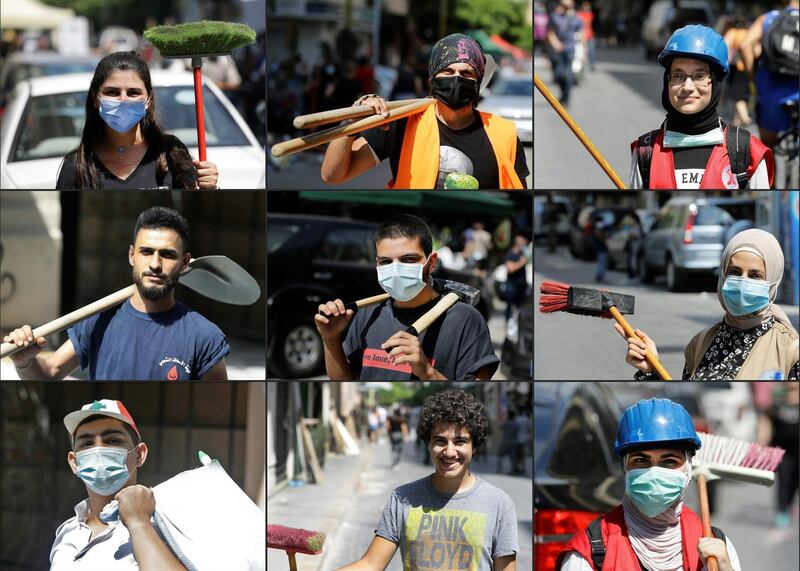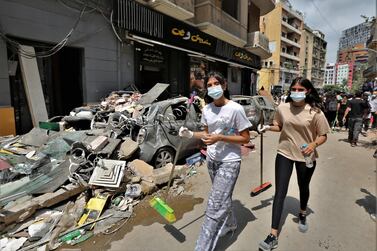With a broomstick in one hand and a large bag of food in the other, Canadian-Lebanese student Jude Hamze heads out every afternoon to provide relief to the hungry and sweep debris from what was once the liveliest of Beirut’s neighbourhoods.
The 19-year-old is one of thousands of young Lebanese who volunteer daily in the wake of the blast that struck the Lebanese capital last week. The nation’s government, which stepped down on Monday, failed to deploy an adequate response to the crisis, leaving Beirut to rely on foreign aid and local volunteers. The devastation wrought by the explosion has triggered a civic call to action, with residents rushing to clean up the wreckage of their city.
"I saw photographs of Beirut on social media, and they scarred me," Ms Hamze told The National. "This was not the Beirut I know. I wanted to fight for the city I love and bring it back to life." On the day of the blast, she went down to the district of Mar Mikhael with her family and posted an Instagram story with their location. More friends began to arrive with brooms and food. "We spent six hours cleaning the streets," she said.
Ms Hamze, who studies architecture in Paris, is due to leave later this month, to commence the new school year. “It saddens me to have to see this unfold from afar, helpless,” she said. “At the same time, I feel lucky to be able to have a good education abroad and maybe come back in the future to help more people.”
Like every summer, thousands of Lebanese expatriates and students studying abroad came back to Lebanon this year, despite coronavirus-related restrictions, only to witness the carnage of August 4.
A hangar containing 2,750 tonnes of ammonium nitrate caught fire and exploded at 6.07pm, leaving at least 177 people dead and thousands injured. The chemical, used in the manufacture of fertilisers and explosives, was stored unsafely for six years after having been offloaded from a Russian-owned ship that had docked in Beirut, and needed repairs. High-level Lebanese officials, including President Michel Aoun, admitted to having known that its hazardous cargo had been stored at the port.
Yasmine Husseini, 19, donated blood to the wounded in the hours after the blast and has been volunteering every day since the incident. “It was my patriotic duty,” she said. The London-based law student said that volunteering is akin to collective therapy. “The only thing that can console you is seeing people help each other.”
Prior to the blast, the Lebanese-American had been studying for her exams, which take place in two weeks. She explained that she felt isolated and homesick when nationwide protests against sectarianism, corruption and dire living conditions spread across Lebanon last October. “I am so glad I was in Lebanon to help this time around. I am cleaning every day now, I cannot think about anything else,” she said.
An investigation into the cause of the blast was due to present its findings within five days. More than a week later, its results have yet to be published.
Lebanese people have taken to the streets since Saturday to demand that the political class step down and those responsible for the blast be prosecuted. Ms Husseini believes that protesting and volunteering are two sides of the same coin. “Even donating to charity is part of the fight against the political class. It means we do not trust the government to do its job,” she said.
She said her experience in London had opened her eyes about the extent to which Lebanese are stripped of basic rights. “Growing up, my parents used to laugh every time they heard the words ‘the government’. As a child, I used to think it was normal to pay for your education, and not have 24/7 access to electricity.”
Power and water cuts have been frequent in Lebanon since the end of its 15-year civil war in 1990. For the past couple of months, electricity blackouts have increased to at least 20 hours a day in Beirut.
Rasha Hamade, 19, also volunteered in Mar Mikhael and in the district of Karantina. “Strangers would walk up to me and say, ‘Thank you.’ They see the brooms and know we are here to help. Meanwhile, the municipality has been absent and the army has only been sent to repress protesters.”
The French-Lebanese film student has now gone back to Montreal.
Lebanon has a diaspora estimated at around 15 million people, more than double the size of its population. Sluggish economic growth and widespread corruption and nepotism have pushed young Lebanese to study and seek employment abroad for many years. Since September 2019, the nation has been battered by an unprecedented financial crisis. The Covid-19 pandemic and the blast have only exacerbated its problems.
Ms Hamade says she wants to help rebuild Beirut after her studies. “It’s part of being Lebanese. You don’t know if you will ever be able to live in your own country one day. But I still have unconditional love for Beirut,” she said.







